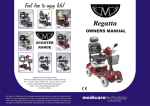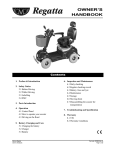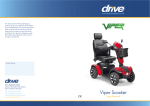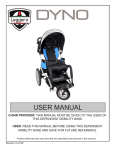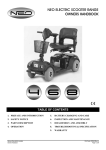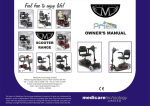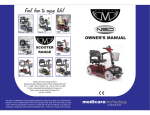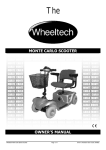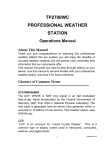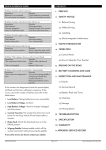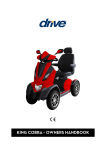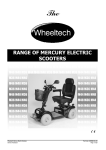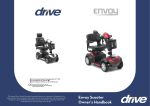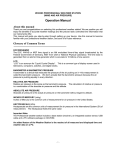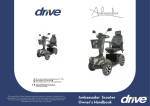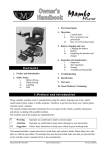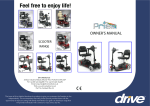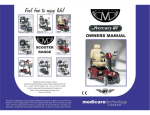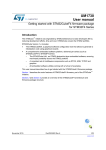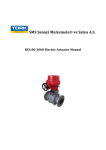Download User Manual - Amazon Web Services
Transcript
OWNER’S HANDBOOK Contents 1. Preface & Introduction 2. Safety Notice 2.1 Before Driving 2.2 Whilst Driving 2.3 Labelling 2.4 EMC 3. Parts Introduction 4. Operation 4.1 Control Panel 4.2 How to operate your scooter 4.3 Driving on the Road 6. Inspection and Maintenance 6.1 Daily checking 6.2 Regular checking record 6.3 Battery, fuse and tyre 6.4 Maintenance 6.5 Storage 6.6 Moving about 6.7 Disassembling the scooter for transportation 7. Troubleshooting and Specification 8. Warranty 8.1 VIN 8.2 Warranty Conditions 5. Battery Charging and Care 5.1 Charging the battery 5.2 Charger 5.3 Battery Mercury Regatta Owner’s Handbook Part code: Z40960 Page 1 of 20 1. Preface and Introduction Please carefully read this owner’s manual before using the vehicle. Improper user of the vehicle could result in harm, injury or traffic accidents. Therefore for maximum pleasure whilst using the vehicle please read this owner’s manual. This owner’s manual includes operation instructions for every aspect of the vehicle, assembly instructions and advice for how to deal with possible accidents. The symbols used in this manual are explained below. Warning Attention Suggestion Improper use could lead to death or serious injury Improper use could lead to injury and/or damage to your scooter Follow these instructions to keep your vehicle in good working order This manual includes a repair and maintenance record chart and warranty details. Please keep it in a safe place or with your scooter. If someone else uses the scooter make sure that you provide him or her with this owners handbook for his or her consideration. As designs change some illustrations and pictures in the manual may not correspond to the vehicle that you purchased. We reserve the right to make design modifications. The Regatta scooter is part of the Mercury range, and has been designed and manufactured to provide a comfortable and secure yet affordable solution for some mobility requirements. Mercury is a brand for Medicare Technology. Drive medical is an ISO 9000 and ISO 13485 certified manufacturer of medical devices and mobility aids. Other products in the Drive medical range include manual wheelchairs, electrically powered wheelchairs, walking aids, bathlifts and bathing equipment, rise recline armchairs and many more mobility and daily living aids. All Drive medical medical devices are CE marked. 2. Safety Notice 2.1 Before Driving The user needs to be familiar with the use and operation of the vehicle before driving. Please bear the following safety notices in mind at all times. Ride on the pavement, single carriageways or pedestrian areas only. Never ride on motorways or dual carriageways. When driving on the road (or crossing the road), be aware of traffic and other road users. Use extreme caution when driving your scooter on busy streets or in shopping malls. Do not drive your scooter when you are tired or after consuming drugs or alcohol. Driving under the influence of alcohol or drugs may be an offence under the Road Traffic Act. Mercury Regatta Owner’s Handbook Part code: Z40960 Page 2 of 20 Take care when driving your scooter in low light. It has not been designed for use at night. The scooter may only be driven on the pavement or pedestrian areas at speeds up to 4mph (6.4kph). Use the indoor / outdoor switch on the lower setting to ensure you do not exceed this speed. The scooter may be driven on single carriage roads with the indoor / outdoor switch set to outdoor. This will allow speeds up to 8mph (12.8kph). Practice operating your vehicle Before using the scooter in busy or potentially dangerous areas, familiarize yourself with the operation of your scooter. Please practice in a wide and open area like a park. In order to avoid accidents with your scooter whilst driving, bear in mind driving motions such as accelerating, braking, turning, reversing and gradients. Turn the speed dial approximately 90º clockwise from the lowest setting for your initial practice For safety, ensure somebody accompanies you when driving on the road for the first time Only use the higher speed setting when you are confident that you can easily operate and control your scooter The Regatta scooter can only be used by one person at a time Do not carry passengers on your scooter (including children) Maximum user mass (weight capacity) The maximum weight that can be carried is 160kg / 25 stone (including occupant and any goods). The maximum weight which can be carried in the basket is 3kg / 7lb. Do not use the scooter to carry or haul goods. 2.2 Whilst Driving Please carry out daily inspections. Refer to the section entitled ‘Daily Checking’. Do not move your body out of the vehicle whilst moving Such action may cause you to lose your balance and risk injury from falling Pay attention that your clothing and other garments do not get tangled or caught in the wheels Do not use your vehicle in the following environments On roads with heavy traffic or roads that are muddy, gravelly, bumpy, narrow, snowed over or icy. Places where you might get the wheels stuck. On canal towpaths which are not guarded by any fence or hedge. Do not drive at night or if it is raining heavily, snowing, misty or windy. Do not drive your vehicle in an ‘S’ pattern or make erratic turnings. Do not take the scooter onto escalators. Under no circumstances should the scooter be used as a seat in a motor vehicle (e.g. cars, buses, trains, etc) Mercury Regatta Owner’s Handbook Part code: Z40960 Page 3 of 20 Gradients and Drops Do not drive on roads with large drops or potholes. Such drops or potholes may cause damage and/or injury. The scooter is capable of climbing a 80mm (3”) obstacle when stationary or a 100mm (4”) obstacle when moving. However, it is not recommended as this may cause damage and/or injury. The ground clearance of the scooter is 160mm (6¼”). Do not cross wide water gutters where there is a risk of getting the wheels stuck. Always use a low speed setting when ascending or descending a gradient. Do not drive on gradients steeper than those stated on the diagram below: USER MASS 135kg (21 stone) MAX. GRADIENT 12º USER MASS 160kg (25 stone) MAX. GRADIENT 8º Warning Do not set in freewheel mode when driving on a gradient. Always re-engage the anti-freewheel device before use. Failure to do so may result in injury. To protect your safety, the power will automatically cut off and the electromagnetic (EM) brake will activate while you are driving down gradients over 15º. This will limit the speed to a safe level. Switch the power off and on again to restart your scooter. Mercury Regatta Owner’s Handbook Part code: Z40960 Page 4 of 20 2.3 Labelling Please carefully read all labels on the scooter before driving it. For your future reference, do not remove them Mercury Regatta Owner’s Handbook Part code: Z40960 Page 5 of 20 This portion of the content will provide the user with basic information that describes the problems with EMI, known sources of EMI, protective measures either to lessen the possibility or exposure or to minimize the degree of exposure, and suggested action should unexpected or erratic movement occur. Attention: It is very important that you read this information regarding the possible effects of electromagnetic interference on your Regatta scooter. 2.4.1 Electromagnetic Interference (EMI) for Radio Wave Sources Powered scooters may be susceptible to electromagnetic interference (EMI), which is interfering electromagnetic energy (EM) emitted from sources such as radio stations, TV stations, amateur radio (HAM) transmitters, two-way radios, and mobile phones. The interference (from radio wave sources) can cause the powered scooter to release its brakes, move by itself, or move in unintended directions. It can also permanently damage the powered scooter’s control system. The intensity of the interfering EM energy can be measured in volts per meter (V/m). Each powered scooter can resist EMI up to a certain intensity. This is called its “immunity level”. The higher the immunity level, the greater the protection. At this time, current technology is capable of achieving at least a 20 V/m immunity level, which would provide useful protection from the more common sources of radiated EMI. This powered scooter model as shipped, with no further modification, has an immunity level of 20 V/m without any accessories. There are a number of sources of relatively intense electromagnetic fields in the everyday environment. Some of these sources are obvious and easy to avoid. Others are not apparent and exposure is unavoidable. However, we believe that by following the warning listed below, your risk to EMI will be minimized. The sources of radiated EMI can be broadly classified into three types: 1. Hand-held portable transceivers (transmitter-receivers with the antenna mounted directly on the transmitting unit). Examples include: citizens band (CB) radios, “walkie talkies”, security, fire, and police transceivers, mobile telephones and other personal communication devices. Attention: Some mobile telephones and similar devices transmit signals while they are ON, even when not being used. 2. Medium-range mobile transceivers, such as those used in police cars, fire trucks, ambulances and taxis. These usually have the antenna mounted on the outside of the scooter. 3. Long-range transmitters and transceivers, such as commercial broadcast transmitters (radio and TV broadcast antenna towers) and amateur (HAM) radios. Mercury Regatta Owner’s Handbook Attention: Other types of hand-held devices, such as cordless phones, laptop computers, AM/FM radios, TV sets, CD players, and cassette players, and small appliances, such as electric shavers and hair dryers, so far as we know, are not likely to cause EMI problems to your powered scooter. Part code: Z40960 Page 6 of 20 2.4.2 Powered Scooter Electromagnetic Interference Because EM energy rapidly becomes more intense as one moves closer to the transmitting antenna (source), the EM fields from hand-held radio wave sources (transceivers) are of special concern. It is possible to unintentionally bring high levels of EM energy very close to the control system of the scooter while using these devices. This can affect powered scooter movement and braking. Therefore, the warnings listed below are recommended to prevent possible interference with the control system of the powered scooter. 2.4.3 Warnings Electromagnetic interference (EMI) from sources such as radio and TV stations, amateur radio (HAM) transmitters, two-way radios, and mobile phones can affect powered scooters. Following the warnings listed below should reduce the chance of unintended brake release or powered scooter movement which could result in serious injury. 1. Do not operate hand-held transceivers-receivers, such as citizens band (CB) radios, or turn ON personal communication devices, such as mobile phones, while the powered scooter is turned ON; 2. Be aware of nearby transmitters, such as radio or TV stations, and try to avoid coming close to them; 3. If unintended movement or brake release occurs, turn the powered scooter OFF as soon as it is safe; 4. Be aware that adding accessories or components, or modifying the powered scooter , may make it more susceptible to EMI ( Note: There is no easy way to evaluate their effect on the overall immunity of the powered scooter ). 5. Report all incidents of unintended movement or brake release to the powered scooter manufacturer, and note whether there is a source of EMI nearby. 2.4.4 Important Information 1. 20 Volts per Metre (V/m) is a generally achievable and useful immunity level against EMI (the higher the level, the greater the protection); 2. This product has an immunity level of 20 V/m without any accessories connected to it. Mercury Regatta Owner’s Handbook Part code: Z40960 Page 7 of 20 3. Parts Description 3.1 Parts Description 1. 2. 3. 4. 5. 6. 7. Basket Headlight Arm rest pad Head rest Seat Seat recline handle Sliding seat handle Mercury Regatta Owner’s Handbook 8. Battery lid 9. Side reflector 10. Rear headlight / indicator 11. Anti-tip wheel 12. Freewheel Lever 13. Charging socket 14. Rear view mirror 15. Control panel 16. Handbrake 17. Front indicator 18. Tiller adjustment handle Part code: Z40960 Page 8 of 20 4. Operation 1 2 3 4 5 6 7 8 4.1 Control Panel 1. Wigwag Paddle 2. Head Light / Rear Light Switch 3. Indoor / Outdoor Switch 4. Battery Gauge 5. Speed Dial 6. Indicator Switch 7. Hazard Warning Light Switch 8. Horn Button 4.2 How To Operate Your Scooter Ignition Switch Use the ignition switch located on the tiller head to switch the scooter on and off. Insert the key in to the ignition and turn the key 90º clockwise to switch the scooter on, or 90º anticlockwise to switch the scooter off. Forward, Reverse and Braking with the Wigwag paddle Push the wigwag paddle section marked ‘Forward’ with your right thumb and the scooter will move forward. Push the wigwag paddle section marked ‘Reverse’ with your left thumb and the scooter will move backwards. When you are reversing, the horn will beep to warn other people. Release the wigwag paddle and the scooter will automatically brake and come to a stop. Do not push both sides of the wigwag paddle simultaneously as this may cause damage to your scooter. The controls can be reversed for people who are left-handed or do not have full use of their right arm. For more information about this please contact your dealer. Manual Brake As well as an electromagnetic brake, the scooter has a manual cable brake. Squeeze the brake lever to apply the brake then release the lever to release the brake. Battery Indicator When the ignition is switched on the battery gauge will illuminate to indicate the remaining battery power by the number of segments lit on the battery gauge. The remaining power indicated by the gauge will vary by the way you drive. Driving up inclines and repeated stopping and starting will consume power more quickly. Mercury Regatta Owner’s Handbook Part code: Z40960 Page 9 of 20 If the battery gauge flashes but the scooter will still drive, then this indicates low battery power and the batteries should be recharged immediately. If the battery gauge flashes and the scooter will not drive, this indicates that a fault has been detected with the scooter. In this case seek advise from your dealer. Suggestion 1. You should recharge the batteries each time the vehicle is used to ensure maximum range and optimal battery performance. If the scooter is stood idle, the batteries should still be charged once a week to maintain battery performance. 2. After charging or replacing a new battery, drive the vehicle for 2 to 3 minutes to ensure the battery capacity is sufficient. Then charge the battery immediately if not recently charged. 3. In wintertime, the battery may respond more slowly and battery range may be reduced. Cold temperatures temporarily reduce battery performance. 4. When driving on a gradient, the battery gauge reading might fluctuate. This is a normal phenomenon and there is no cause for concern. 5. Even if a battery is used properly, it is natural for the battery’s capacity to reduce with time, which results in reduced battery range. The batteries should be replaced when you find that battery range is about only half of the range of when the batteries were performing optimally. Please see your dealer about replacement batteries and the safe disposal of your old batteries. If you continue to use the batteries, it is likely you will see a rapid decline in performance. 6. The battery range is reduced when driving frequently up gradients or on rough terrain, as this causes greater power consumption. Speed Dial The speed dial determines the maximum speed of the scooter. Turn the dial clockwise to increase the maximum speed, or turn anticlockwise to decrease the maximum speed. Indicator switch This switch flashes the right hand side or left hand side indicators intermittently. To use the indicators, push the switch in the required direction of travel (i.e. left or right) and release the switch. To switch the indicators off, push the switch in and release. Hazard Warning Light Switch Press and release the switch to operate the hazard warning lights. Press the switch again to stop the hazard warning lights flashing. Horn Button Press the Horn button to sound the horn. Release the button to stop the horn from sounding. Mercury Regatta Owner’s Handbook Part code: Z40960 Page 10 of 20 Seat You can adjust the amount of legroom on the scooter by sliding the seat back and forth. To slide the seat, lift up the seat sliding handle (B). Then adjust the seat to correct position, release the handle and continue sliding the seat until it locks in position. To alter the backrest angle, pull up on the seat recline lever, then adjust the backrest to the required position and release the lever. Please note if nobody is using the backrest when the lever is operated, it will automatically spring the backrest forward to fold the seat. B A The seat can rotate 360° and locks in 45° settings. To rotate, lift up the lever (A) located underneath the right hand side of the seat and swivel seat. Release the lever and carry on swivelling the seat until it locks in position. Armrest Adjustment To adjust the armrest width, loosen the knobs at the back of the seat base. Slide the armrests in and out until the required position is reached. Retighten the knobs to secure. To adjust the angle of the armrest, flip up the armrest pad and adjust the jam nut located underneath the armpads toward the back of the seat. Braking Electromagnetic (EM) brake. This is the primary brake. Release the wigwag paddle completely and the EM brake will be activated automatically and will bring the scooter to a halt. Manual brake. This is a secondary brake in addition to the EM brake. Squeeze the brake lever to apply the brake and then release the lever. The manual brake tightness can be adjusted by the brake cable adjuster near the left hand side wheel rear wheel. Freewheel Mode NEUTRAL DRIVE Mercury Regatta Owner’s Handbook To engage the motor: Push in the freewheel lever (arrowed in photo) completely. The scooter can be driven by the motor. To freewheel: Pull out the freewheel lever completely. The scooter can now be pushed manually. Note the EM brake and motor are now disengaged. Part code: Z40960 Page 11 of 20 Tiller Adjustment The tiller can be adjusted into several positions. 1. Push (or pull) the lever on the scooter tiller to adjust the tiller to the position you require. 2. Release the lever to lock the tiller Main Circuit Breaker (Reset button) If the scooter is overloaded it will result in the circuit breaker tripping to protect the scooter from damage. This may be the result of low battery power, excessive load being carried and / or the scooter travelling up an incline. If this occurs, push the button shown in to reset the scooter. 4.3 Driving on the Road 1. 2. 3. 4. 5. 6. 7. 8. 9. Starting and Driving Ensure the seat is installed correctly and in the forwards position. Ensure the tiller and seat are adjusted for a comfortable driving position. Fold down the armrests so you can place your arms on them. Switch the ignition on. If necessary, switch on the headlights. Check the battery indicator to see if there is enough power for your trip. If you have any doubt about the remaining power, please recharge the batteries before departure. Set the speed dial to a setting you are safe and comfortable with. Check the wigwag paddle works correctly. Check the electromagnetic brake works correctly. Ensure it is safe around you before you drive on the street or road. Engage the indoor switch if you are driving on the pavement or indoors. Attention 1. Do not push both sides of the wigwag paddle simultaneously. This may leave you unable to control your scooter, and could cause damage or injury. 2. Do not switch the ignition off while driving as this will lead to an emergency stop and possible risk of damage or injury. 3. Do not set to the highest speed setting whilst driving indoors. 4. Do not adjust the speed dial whilst driving. A sudden change in speed may cause danger to yourself and others, and may cause damage to your scooter. 5. Do not place magnetic devices near the scooters electrical parts as this could affect the safe operation of the scooter. 6. Be careful while driving in heavy traffic or in crowded areas. 7. Whilst reversing the vehicle, beware of people or objects behind you. When reversing, the scooter will sound an audible warning alarm. Mercury Regatta Owner’s Handbook Part code: Z40960 Page 12 of 20 5. Battery Charging and Care 5.1 Charging the Battery Follow the procedure below: 1. Switch the ignition off. 2. Connect the charger power cord in to the main socket. 3. Open the charging socket cap on the scooter tiller. Then connect the charger round plug in to the scooter charging socket located on the left hand side of the tiller. 4. Switch the charger on at the mains. 5. Both the charger’s red and orange LEDs will be lit when charging commences. The charging duration will be around 14 hours. To ensure optimum performance an 18 hour charge is recommended. We do not recommend the scooter be charged for longer than 24 hours. 6. Both the charger’s LEDs will be lit during the charging process. The orange LED will turn green when bulk charging is complete after which the charger trickle charges the batteries. Trickle charging optimises the batteries and is necessary to maintain or improve battery performance. 7. Switch off the charger, disconnect the power cord and round plug from the charger socket on the scooter. Attention If only a red LED is lit on the charger, then the scooter is not connected. If no LEDs are lit on the charger, then the charger is not connected to the power or it is defective. Please only use a charger supplied by Medicare Technology. You may damage the battery and / or scooter if you use an incorrect charger. Always charge the battery to its full capacity every time. Do not charge in temperatures below –10ºC or above +50ºC as the charger may not work efficiently and the batteries may become damaged. Warning Keep away from flammable objects while charging as it may lead to fire or battery explosion. Do not smoke while charging as the battery may release hydrogen gas. Always charge the batteries in a well ventilated environment which is not in direct sunlight. Do not charge in surroundings where it is humid, wet or damp. Do not handle the charger, scooter or mains socket with wet hands, as this could lead to electric shock. 5.2 Battery Do not expose the battery to temperatures below –10ºC or above 50ºC. Such temperatures may cause the battery to freeze or overheat. This will damage the batteries and shorten their life. The batteries are sealed and there is no need to refill them with water. Mercury Regatta Owner’s Handbook Part code: Z40960 Page 13 of 20 The batteries need charging on a regular bases. Even if the scooter is stood idle, the batteries should be charged at least once a week. The batteries carry a one-year manufacturers warranty. This warranty only covers manufacturing defects, and not faults arising from failure to adhere to the operating and charging instructions. Suggestion – How to Maximise your Batteries Efficiency and Service Life 1. Fully recharge your new battery before its first use. 2. Make sure you charge the battery fully every time. The battery longevity will be shortened if it is repeatedly used without being fully charged. Always wait until the orange LED on the charger turns green before switching off or disconnecting the charger. 3. When fully charged, the battery charger will still trickle charge the battery to ensure optimum range. 4. Keep your batteries fully charged whenever possible. 5. If the scooter is stood idle, it should be charged at least every week to keep the battery in a fully usable condition. 6. The ambient temperature will affect charging time. Charging time will be longer in winter when it is cold. 7. After charging do not leave the charger socket plugged in to the scooter as this will cause a power drain on the scooter and temporarily reduce its range. 8. It is recommended that the scooter is given an 18 hour charge at least once a week to allow the charger to optimise the batteries. 9. Should you experience range or power problems, charge the scooter for 24 hours and then retry the scooter. Cleaning the Battery If the batteries are contaminated by water, battery acid, dust or other substances, they will discharge quickly. The batteries supplied with the scooter are sealed and as such are maintenance free with no risk of battery leakage. Please follow the steps below to clean the battery: 1. Remove the batteries following the procedure below. 2. Clean the battery with a clean cloth. If the terminal is covered by white powder, wipe it cleaning using warm water. Removing the Battery 1. Switch off the scooter at the ignition and remove the seat. 2. Lift up the battery cover (A) 3. Disconnect the black battery connectors (B) and red battery connectors. 4. Remove the velcro straps (C) from the battery and pull the battery out. Mercury Regatta Owner’s Handbook A B C Part code: Z40960 Page 14 of 20 6. Inspection and Maintenance 6.1 Inspection Clean the scooter with a damp cloth and dust down approximately once a week to preserve the appearance of the scooter. Adjust the tiller height and return to the original position and swivel the seat once a week to prevent moving parts from seizing up. Check for signs of wear and tear on the tyres and the upholstery on a regular basis. For optimum performance and to increase the lifespan of your scooter, it is recommended that you have your scooter serviced once a year. Attention Switch the scooter off at the ignition and remove any charger cords prior to conducting any maintenance. 6.2 Regular Checking Record To ensure your scooter is correctly serviced, take it to your dealer for regular maintenance checks. The scooter should be checked for an initial inspection after 1 month. Your dealer may charge a fee for this service. YEAR Service Dates Controller On/off switch Control Lever Braking Recharge point Batteries Levels Connections Discharge test Wheels and Tyres Wear Pressure Bearings Wheel nuts Motors Wiring Noise Connections Brake Brushes Chassis Condition Steering Mercury Regatta Owner’s Handbook 1 2 3 4 5 YEAR Service Dates Upholstery Seat Back Armrests Electrics Connections condition Lights Test run Forwards Reverse Emergency stop Left turn Right turn Slope test Over obstacles List Items repaired 1 2 3 4 5 Part code: Z40960 Page 15 of 20 6.3 Fuses Battery charger fuse. If the battery charger is switched on and no LEDs are lit, check the fuse. 6.4 Tyres The condition of the tyres depends on how you drive and use the scooter. Please check the tyre tread depth regularly. Replace the tyres when there is less than 0.5mm tread on the tyres. Attention When tread depth is less than 0.5mm it can easily lead to the vehicle slipping and braking distances will become longer. Therefore, replace any tyres with low tread depth as soon as possible. The tyre pressure should be kept at around 26psi (1.8bar) for the best ride and handling. Suggestion Ensure water is not directly splashed on to your scooter as this can cause damage to the electrics. Do not use petrol, solvents or vaporizing solution as these may deform or damage the shrouds. Do not use wax. 6.5 Storage Ensure the vehicle is stored with the seat set in the ‘forward’ position and switched off at the ignition. Store the scooter in an environment away from direct sunlight or damp. When storing for long periods of time, charge the battery fully and then disconnect the battery terminal. 6.6 Moving About Switch the scooter off at the ignition before moving. Lift the scooter by the chassis (not the bumpers). Lifting the scooter by the bumpers could cause damage or injury. For your safety, always ask for help if required. You will need 2 or 3 people when moving or lifting the vehicle. To reduce the weight of the vehicle, remove the seat and batteries if required. 6.7 Disassembling the Scooter The scooter can be disassembled for ease of transportation or storage. For information on how to do this, please contact your Drive medical dealer. Mercury Regatta Owner’s Handbook Part code: Z40960 Page 16 of 20 7. Troubleshooting and Specification 7.1 Troubleshooting: Symptom The scooter will not switch on The scooter switches on, but will not move The scooter appears slow The seat turns when in operation Horn sounds involuntarily Mercury Regatta Owner’s Handbook Remedy Try recharging the battery Check the circuit breaker and fuse in the scooter Ensure there is enough power in the batteries. If not, recharge the batteries. Ensure the freewheel lever is engaged in the ‘Drive’ position. Check the battery power level and recharge Check the speed dial is not set to slow, or indoor setting engaged. Slowly rotate the seat until it drops in to place and is secure. Ensure that the wigwag paddle is released. Switch the scooter off and on Recharge the batteries If the problem persists, please contact you Drive medical dealer Part code: Z40960 Page 17 of 20 7.2 Specification: Model Mercury Regatta (MREG) Model Dimensions 146cm x 67cm x 114cm Motor (L x W x H) 57½” x 26½” x 45” Mercury Regatta (MREG) 24V 500W DC / 0.67hp Batteries (pair) 12V 44ah 33cm x 10cm / 13” x 4” Weight (total) 117kg / 257lb Wheels “ (w/o battery) 89kg / 195lb Top speed* 8mph / 12.8kph* Drive system Direct drive to rear wheels Climbing angle* 12º / 1 in 5* Braking system Electromagnetic - primary Ground clearance 16cm / 6¼” Control system Drum cable brake - secondary Cruising range* 25 miles / 40kpm* Dynamics Rhino 110A Weight capacity 160kg / 25 stone * Note: Maximum driving distance (cruising range) is based on an ambient temperature of 20°C, a 100kg driver and a battery which has reached optimum capacity, a constant driving speed of 6mph / 9kph with 70% battery power discharged. The top speed, climbing angle and cruising range may be affected by a number of factors including (but not exclusively) user mass, gradient, speed, temperature, and terrain. When a battery is new off-the-shelf it is approximately two-thirds of its optimum capabilities. During the first 3 – 6 months of use the batteries will improve to a peak point at which they will remain for 50% - 60% of their expected lifespan (if maintained and charged correctly, as described in this manual). At this point the batteries will begin to deteriorate until they will require replacing. It is for this reason that the batteries must be correctly charged at all times else the peak point reached may not be the batteries’ optimum capacity and their lifespan may be dramatically reduced. The manufacturer reserves the right to modify the specification if necessary. The final specification is subject to the individual scooter your purchase from your dealer. 8. Warranty 8.1 VIN (Vehicle Identification Number) To ensure the correct after sales service and warranty service support, please write down the vehicle identification number on the plate attached the rear left-hand side of the scooter frame (by the anti-tip wheel). Also note down the details of the Drive medical dealer who sold the scooter. Model ……….. VIN #. Mercury Regatta Owner’s Handbook ……………… Motor serial #: ……………….. Key #: …………. Part code: Z40960 Page 18 of 20 Drive medical Authorized Service Agent Details: Name Address Tel Postcode 8.2 Warranty Conditions There is a comprehensive twelve-month warranty from the date on which your new scooter is delivered. The warranty covers the scooter for repairs or replacement during this period. For more detail, please see the Warranty Conditions below. Warranty Conditions: 1. Any work or replacement part installation must be carried out by an authorized Drive medical dealer / service agent. 2. To apply the warranty should your scooter require attention please contact the designated service agent listed above. 3. Should any part of the scooter require repair or full or part replacement, as a result of a manufacturing or material defect within twelve months of receiving the scooter, replacement parts will be supplied free of charge. Note: This guarantee is not transferable 4. Any repaired or replaced parts will be covered by this warranty for the balance of the warranty period on the scooter. 5. Parts replaced after the original warranty has expired will by covered by a three months warranty. 6. Consumable items supplied will not generally be covered during the normal warranty period unless such items require repair or replacement clearly as a direct result of a manufacturing or material defect. Such items include (among others): 7. upholstery, tyres and batteries. The above warranty conditions apply to brand new scooter purchased at the full retail price. Scooters supplied as secondhand by Drive medical normally carry a six-month warranty. If you are unsure whether your scooter is covered, check with the service agent. 8. Under normal circumstances, no responsibility will be accepted where the scooter has failed as a direct result of: a) The scooter part not having been maintained in accordance with the manufacturer’s recommendations. b) Failure to use the manufacturer’s specified parts c) The scooter or part having been damaged due to neglect, accident or improper use d) The scooter or part having been altered from the manufacturer’s specifications or repairs having been attempted before the service agent is notified Please note your local service agent’s contact details in the box above. In the event of your scooter requiring attention, contact them and give all relevant details so they can act quickly. The manufacturer reserves the right to alter without notices any weights, measurements or other technical data shown in this manual. All figures, measurements and capacities shown in this manual are approximate and do not constitute specifications. Mercury Regatta Owner’s Handbook Part code: Z40960 Page 19 of 20 Notes and Additions Mercury Regatta Owner’s Handbook Part code: Z40960 Page 20 of 20




















